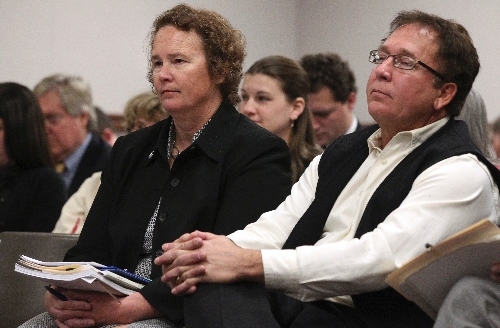Mining industry facing scrutiny
Some Republican legislators are joining left-leaning critics of Nevada's mining industry in demanding justification for why the state's mine operators receive annual tax breaks worth hundreds of millions of dollars.
The new scrutiny from the right comes after former Nevada taxation director Dino DiCianno abruptly retired following an admission Thursday that his department has no auditors trained to inspect mining companies' payment of "net proceeds of minerals" taxes.
The admission during a Senate Revenue Committee hearing prompted sharp rebukes from state Senate Majority Leader Steven Horsford, D-Las Vegas, and longtime mining critic Sen. Sheila Leslie, D-Reno.
But DiCianno's remarks also raised red flags with Republicans, meaning there is now bipartisan pressure on mine operators to justify their tax breaks.
"It was kind of jaw-dropping," said Sen. Michael Roberson, R-Las Vegas.
Roberson said he favors reducing deductions mining companies can take in calculating net proceeds payments. To make the proposal revenue neutral, he suggests cutting the government services tax on car registrations.
"That is going to affect the average Nevadan in a positive way," Roberson said, adding that mining tax revenues would replace car registration taxes that now go to counties or school districts.
Roberson called it "a good plan to take the burden off regular Nevadans and take away some of these deductions from Canadian mining companies."
It's the second time this session Roberson has joined mining industry critics. Last month during a Senate Judiciary Committee meeting, he spoke in favor of Leslie's bill that would strip mining companies of the right to acquire property by eminent domain. His remarks helped pick up support from both major parties. It passed the state Senate on a 20-1 vote.
Roberson isn't the only Republican calling for more scrutiny of mining industry tax breaks.
"If there are some egregious deductions that could be reasonably reduced, of course you should look at that," Assemblyman Mark Sherwood, R-Henderson, said Friday.
Assembly Minority Leader Pete Goicoechea, R-Eureka, said changing how mining is taxed is premature until existing payments are audited.
"Let's see where we are at before we go ahead and change it," he said.
Even if Republican lawmakers join the effort, it won't be easy to change the complicated tax on mine operators' property and proceeds, which has a rate cap built into the state constitution. In short, the most profitable operators pay 5 percent of "net proceeds" they report.
In 2009, mines reported a total of nearly $1.8 billion in net proceeds and paid nearly $97.6 million in state and county taxes.
Critics of the industry say the tax is too low and allows billions of dollars in deductions for everything from major capital expenses to marketing in calculating the net.
In 2009 the gross proceeds, the value of extracted minerals before deductions, was $5.8 billion, with $5.1 billion coming from gold and silver.
Mining industry officials say new interest in the tax comes from a high number of freshmen lawmakers who don't fully understand it. They point out the net proceeds tax is designed to be a property tax, not an income tax, and deductions are legitimate because of the high cost of extraction.
Taking away mine operator deductions would be "arbitrarily changing the value of their property," said Tim Crowley, Nevada Mining Association president. Explaining the nuance to critics "is an issue now of educating," he said.
Changing the mine tax also may be a tough sell to Republican Gov. Brian Sandoval, who campaigned on a pledge not to raise taxes.
Sandoval spokeswoman Mary-Sarah Kinner indicated Friday that he wouldn't support lawmakers if they sought changes that increased the mine operators' tax burden. "Changes to deductions would likely result in a tax increase, and the governor's position on taxes is very clear," Kinner said.
Contact reporter Benjamin Spillman at
bspillman@reviewjournal.com or 702-477-3861.






















